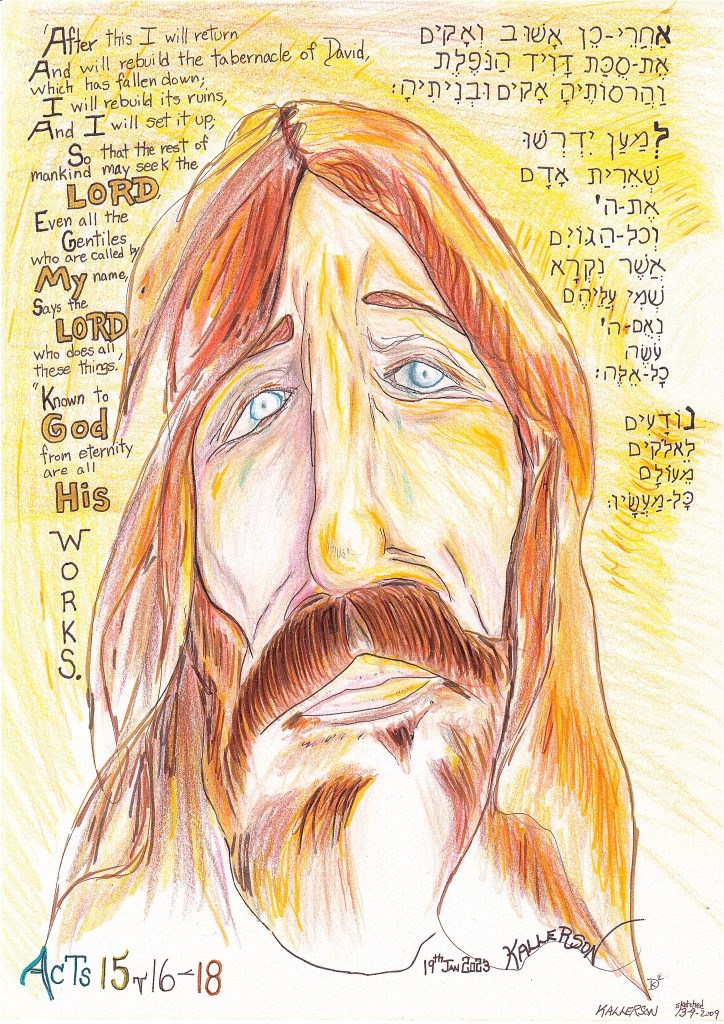
Artwork by Doug Kallerson.
Friday, 17 March 2023
‘After this I will return
And will rebuild the tabernacle of David, which has fallen down;
I will rebuild its ruins,
And I will set it up; Acts 15:16
Note: You can listen to today’s commentary courtesy of our friends at “Bible in Ten” podcast. (Click Here to listen).
You can also read this commentary, with music, courtesy of our friends at “Discern the Bible” on YouTube. (Click Here to listen), or at Rumble (Click Here to listen).
James just noted that the words of the prophets agree with the idea that God first visited to take out of nations a people for His name. With that, he now cites Amos 9:11 & 12 to confirm this. As is often the case in the New Testament, the quote is from the Greek translation, not the Hebrew. Further, there is even a bit of deviation from the Greek in verse 15:16.
That verse begins with, “After this I will return.” Rather, the word translated as “this” is a plural demonstrative pronoun. It reads, “After these things I will return.” The reference is to what is said in the earlier verses of Amos 9. They speak of Israel’s destruction and exile. In those verses, the Lord says –
“‘Are you not like the people of Ethiopia to Me,
O children of Israel?’ says the Lord.
‘Did I not bring up Israel from the land of Egypt,
The Philistines from Caphtor,
And the Syrians from Kir?’” Amos 9:7
In essence, the Lord is saying to Israel, “You are just like any other people. Other than your relationship with Me, you are just people.” To show them this, He was going to take a different direction, working among the Gentiles of whom they thought they were better. Because of their sinful state, rejecting the Lord, they would enter a time of punishment, being scattered among the nations. It is “After these things” that the Lord will return.
The meaning of that is that He will revisit Israel. It is as if he had departed from them and was now returned to them. His attention was on their destruction, but it would be changed to their re-establishment and prosperity. It is at this prophesied time that it next says, “And will rebuild the tabernacle of David.”
The tabernacle is a booth or temporary shelter used during the Feast of Tabernacles. This was a feast where the people gathered in Jerusalem, meeting to acknowledge that the Lord was Israel’s protector. They had been brought out of Egypt, having been rescued from their bondage. They were wholly dependent on the Lord and were living in close and intimate contact with Him.
The “tabernacle of David” is specifically speaking of the royal house of David. Despite being the king, he too would have participated in the annual festival, dwelling in a tabernacle in this intimate fellowship with the Lord. What is being conveyed is that the rule and authority of Israel under the House of David would be restored to Israel, but it would be in a way that resembled the tabernacle, or booth.
Thus, it refers to the Person of Jesus, the Messiah who is the Greater David. For example, the verb form of the word is used when speaking of Christ in John 1 –
“And the Word became flesh and dwelt among us, and we beheld His glory, the glory as of the only begotten of the Father, full of grace and truth.” John 1:14
The noun form is used when referring to the intimate dwelling together of God and man in Revelation 21 –
“And I heard a loud voice from heaven saying, ‘Behold, the tabernacle of God is with men, and He will dwell with them, and they shall be His people. God Himself will be with them and be their God.’” Revelation 21:3
It is the intimate fellowship between the House of David and the Lord that would be rebuilt. Understanding this, the next words read, “which has fallen down.”
The Davidic line of kings ceased at the time of the Babylonian exile. From that time on there was no Israelite king of the line of David, in the sense of leading the nation. The line of kingship in the house of David was prophesied to end by Jeremiah –
“‘As I live,’ says the Lord, ‘though Coniah the son of Jehoiakim, king of Judah, were the signet on My right hand, yet I would pluck you off; 25 and I will give you into the hand of those who seek your life, and into the hand of those whose face you fear—the hand of Nebuchadnezzar king of Babylon and the hand of the Chaldeans.’” Jeremiah 22:24, 25
However, the line of David itself was not cut off. After the exile, it continued on as is testified to in Haggai –
And again the word of the Lord came to Haggai on the twenty-fourth day of the month, saying, 21 “Speak to Zerubbabel, governor of Judah, saying:
‘I will shake heaven and earth.
22 I will overthrow the throne of kingdoms;
I will destroy the strength of the Gentile kingdoms.
I will overthrow the chariots
And those who ride in them;
The horses and their riders shall come down,
Every one by the sword of his brother.
23 ‘In that day,’ says the Lord of hosts, ‘I will take you, Zerubbabel My servant, the son of Shealtiel,’ says the Lord, ‘and will make you like a signet ring; for I have chosen you,’ says the Lord of hosts.” Haggai 2:20-23
The royal line was cut off in Coniah, but it was re-established after the exile to Babylon in Zerubbabel. It is Zerubbabel who is listed in Jesus’ genealogy in Luke 3:27, continuing this royal line leading to Israel’s Messiah.
This does not mean, however, that Zerubbabel was the rebuilt tabernacle signifying the rule of the House of David. Israel had no Davidic king again. Rather, they were ruled by other nations. Even when Herod ruled over Israel this is true. He was neither of the line of David nor was he the final authority over Israel. His rule fell under the jurisdiction of Rome.
With this understood, the words of the prophet being cited by James continue with, “I will rebuild its ruins.” Again, it is referring to the tabernacle of David, meaning the intimate fellowship with the Lord of the kingship of Israel over the people. The wording is speaking of a time when Davidic rule would again be realized in the land. This has never occurred since the time of Coniah whom Jeremiah referred to.
Of these words, Albert Barnes rightly states, “The ruins thereof – Heb. ‘close up the breaches thereof.’ That is, it would be restored to its former prosperity and magnificence; an emblem of the favor of God, and of the spiritual blessings that would in future times descend on the Jewish people.” This is what James is saying would occur. With that, the words of this verse end with, “And I will set it up.”
As with the previous clause, it is still referring to the tabernacle of David. There is a time prophesied that will come when the Davidic rule will again be established over Israel. It must be remembered that the words “After these things” set the tone for what is being debated in the council. It is based on these words of the prophet now being cited by James. That is based on the words of verse 15:14 that God first visited to take out of nations a people for His name.
In other words, the things being cited from Amos are not referring to the time leading up to the coming of Jesus and His spiritual rule over the church at this time, but to the second coming of Jesus and a literal rule over Israel. This is important to understand. Equating these words with the church is a completely false notion that is not supported by the words of Amos nor by the rest of Scripture. This will be seen more clearly with the evaluation of the next verse.
Life application: It is true that much of the church rejects a literal re-establishment of Israel and a millennial reign of Christ. These things are spiritualized forming the doctrine of replacement theology which says the church has replaced Israel and that everything spoken of in the past was referring not to Israel’s future, but to the current state of the world where Christ rules the church.
This cannot be. The surrounding words of Amos do not support this, nor do the rest of the words of Moses and the prophets. Even the New Testament cannot be seen to agree with this. If God has rejected Israel as a nation, it means the words of the covenant made between the Lord and Israel cannot be trusted. If that is true, then the words of the New Covenant cannot be trusted either. The same Lord who established the Mosaic Covenant is the Lord who has established the New Covenant.
Have faith that despite Israel’s failings, the Lord will never reject them as His people. Likewise, despite your failings, the Lord will never reject you because of what He has done through Christ Jesus. When the terms of the covenant are met, the deal is done. If you have believed the gospel, you have been saved, once and for all time.
Lord God, thank You for the lesson of Israel. Despite their continued unfaithfulness, You have remained faithful to them. We can learn from this that despite our unfaithfulness, You will always remain faithful to us. Thank You for this assurance in our hope of eternal life. Thank You! Amen.





